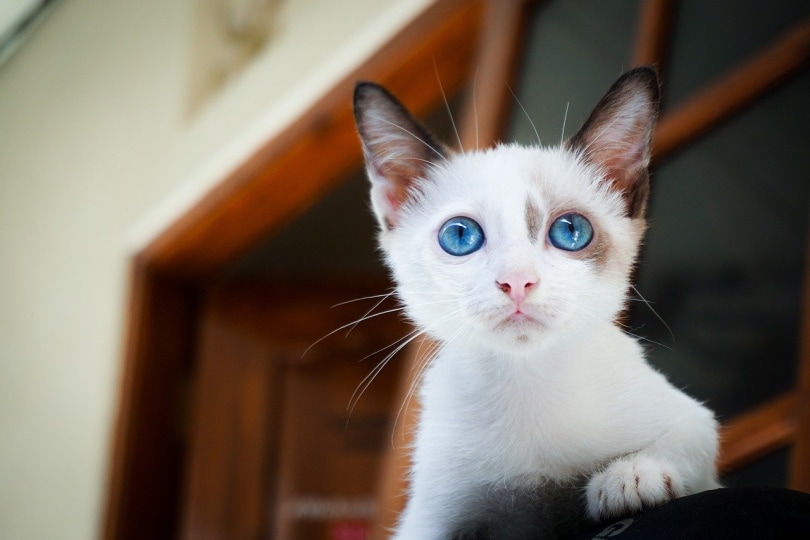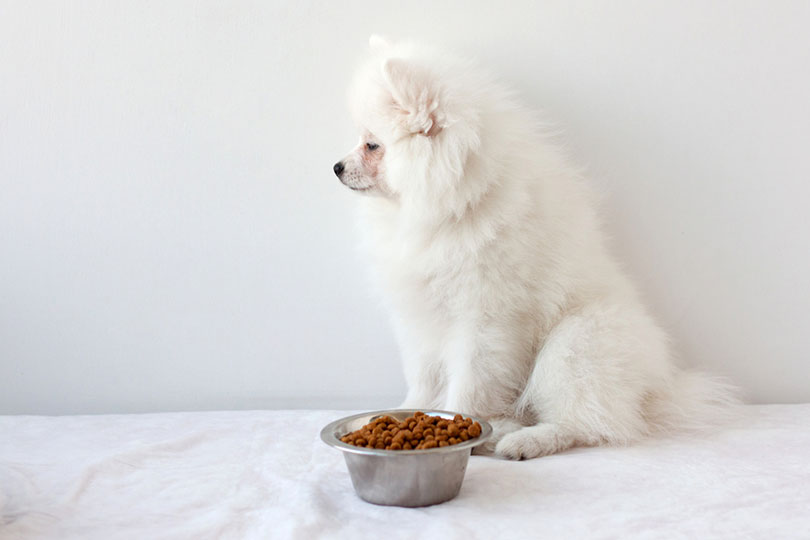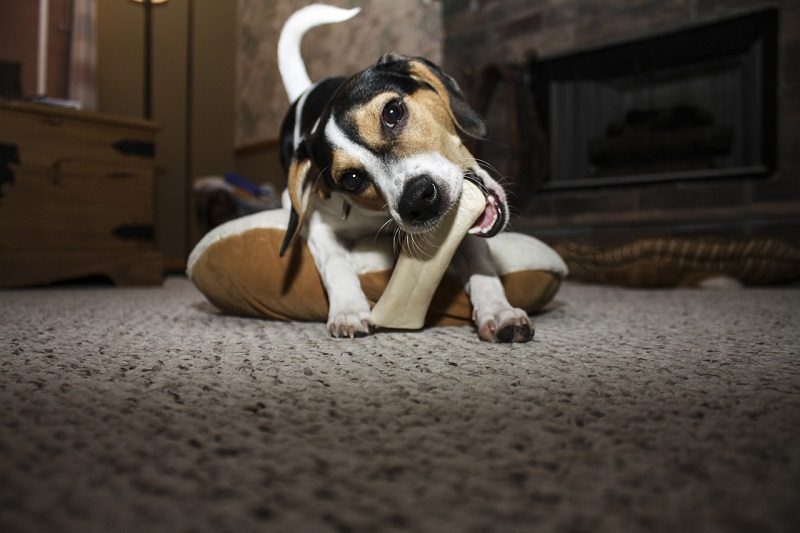My Dog Ate Corn Cobs! Our Vet Explains What to Do

Updated on
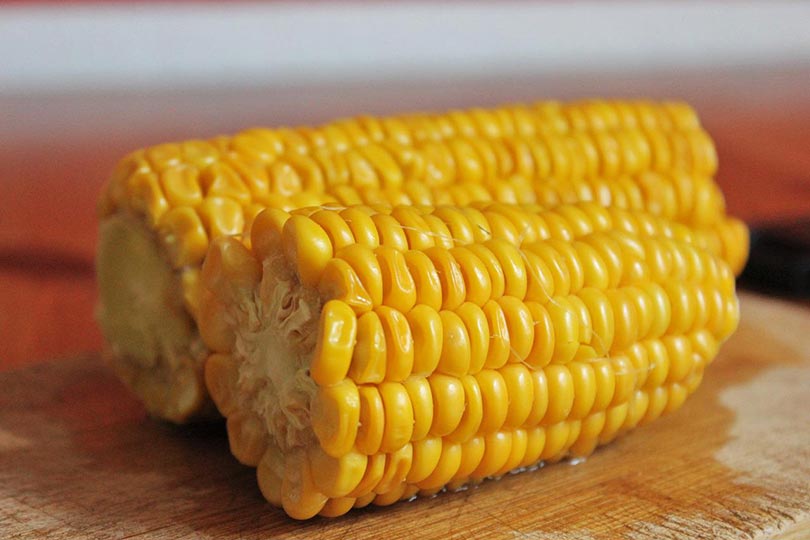
Whether your dog stole one from the bin when you weren’t looking or your well-meaning friend gave your dog a corn cob as a chew toy, you’re not alone. It’s quite common for dogs to eat corn cobs, but can dogs eat corn cobs safely? And what should you do if your dog ate a corn cob?
What Should I Do if My Dog Eats a Corn Cob?
Unfortunately, unlike some foreign objects, corn cobs rarely pass through your dog’s gastrointestinal tract by themselves. If your dog eats a corn cob, follow our instructions for what to do next:
1. Prevent Further Access
The last thing you need is for your dog, or another pet, to eat more corn cobs. If there is a spillage or any remaining cob, remove it from your dog and quickly clean it away to protect other animals in the house.
2. Call Your Veterinarian
Because corn cobs are so frequently dangerous, you should call your veterinarian for advice right away. If your veterinarian is not open, call the nearest open clinic, which may be an emergency clinic. Tell them when you think your dog ate the corn cob and how much they ate. They will then be able to give you tailored advice as to what to do next.
3. Follow Your Vet’s Instructions
Your veterinarian will have used the information to give you some options. Make sure you follow your vet’s advice and call them back if you aren’t sure what to do next. If your dog ate a corn cob and it was more than a little nibble, they may ask you to come in to have the corn cob removed preventatively, but this is up to the clinic, their facilities, and your dog.
4. Do Not Try to Treat the Problem at Home
It is not a good idea to attempt to treat the problem at home yourself, either by making the dog sick or by giving laxatives. Inducing vomiting after a corn cob is not always advisable, as the cob can become lodged in the esophagus (gullet), making removal much harder. Drugs given to induce vomiting in dogs at home are often quite toxic, and they can restrict the options for your dog further down the line, as well as result in a delay in your dog receiving appropriate treatment. Instead, follow your vet’s instructions.
Can My Dog Eat Corn on the Cob?
Even if your dog begs for it, steer clear. Feeding vegetables to your dog can be a healthy way of providing additional energy and nutrients as part of a balanced diet. Many vegetables are suitable for feeding your dog, but an exception is corn cobs. There may be a temptation to offer these to your dog at the family BBQ as an alternative to high-calorie sausages, but corn cobs can pose a danger to your dog. While the corn itself is not toxic, the cob can cause blockages.
Why Are Corn Cobs Bad for Dogs?
Dogs will readily eat corn cobs, but that doesn’t mean they’re good for them. Any dog parent knows that dogs are prone to eating things they shouldn’t, and the sweet crunchiness of a corn cob is no exception. Given their size, shape, and tough fibrous texture, corn cobs are difficult to digest and may become lodged in part of the dog’s intestine and cause a blockage. They are also very absorbent and can cause dehydration of the guts, further increasing the chance of a blockage occurring. The tough, fibrous exterior of the corn cob can even damage the lining of the intestine.
An intestinal blockage caused by a foreign object such as a corn cob will cause your dog to become unwell and require veterinary treatment. Without treatment, the blockage would cause dehydration, loss of appetite, and damage to the bowel, which can be life-threatening. The blockage can also pierce or wear through the wall of the intestine, which causes a leak of gut contents that is often fatal. If left untreated, your dog can die from a blockage caused by a corn cob within just a few days.
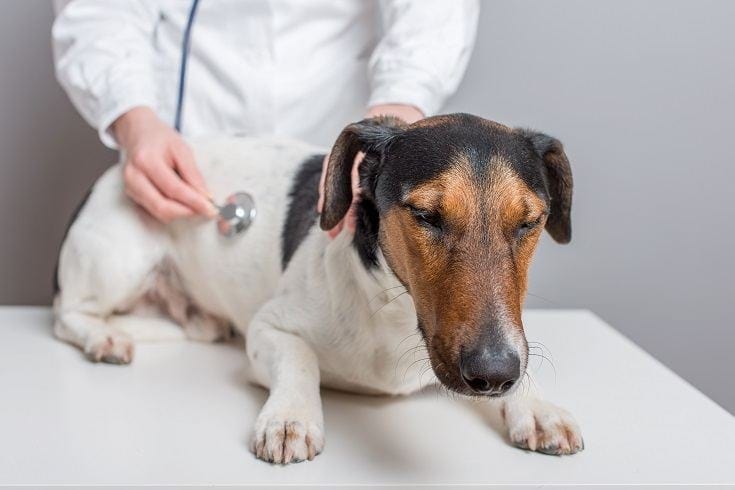
What Are the Signs of Corn Cob Blockage?
If your dog has eaten corn cobs without you noticing, you might not have called the vet yet. But you may become suspicious if your dog starts acting unwell. You may notice that your dog becomes lethargic or appears out of sorts. A lack of appetite is also common. If your dog is unable to keep food or water down, then a blockage is very likely, and they’re also at severe risk of dehydration. Other signs of a corn cob blockage include:
- Lack of appetite or picking at food
- Vomiting
- Diarrhea or constipation
- Lethargy or appears out of sorts
- Abdominal pain, such as grunting when being lifted
- Adopting the “downward dog” or “prayer” position
- Restlessness
 What Will the Vet Do if My Dog Ate a Corn Cob?
What Will the Vet Do if My Dog Ate a Corn Cob?
Your vet will ask you when the corn cobs were ingested and how much was eaten. They will usually ask you to bring the dog to the clinic so that they can perform a physical examination of your pet. During examination, your vet may find signs that your dog is dehydrated due to losing fluids in sickness or diarrhea. Your dog may also be found to have a swollen and painful abdomen.
Depending on their findings, your vet will likely advise that an X-ray is performed to assess your dog’s abdomen. This usually requires sedation. An X-ray will often show whether there is a blockage in the intestines caused by the corn cob, although in the early stages it can be hard to assess. Sometimes your vet may also perform an ultrasound scan to further assess the intestines, as this can provide information on the location of the blockage and the inflammation it has caused to the intestines.
Occasionally, pieces of corn cob may become lodged in the early part of the gastrointestinal tract; for example, at the back of the throat and or in the esophagus (gullet). It may even be in the stomach. In these cases, your vet may be able to remove the blockage without the need for surgery, especially if they have a flexible stomach camera (gastroscope).
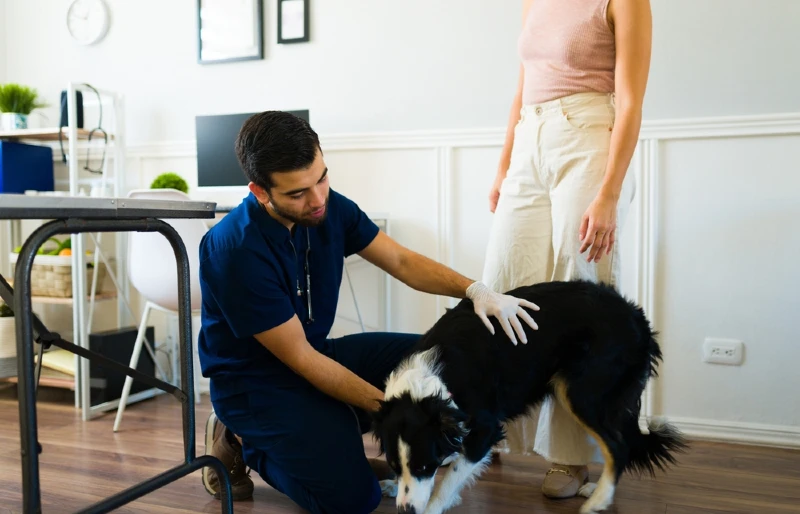
Treatment for a Dog That Ate Corn on the Cob
If your dog is not too unwell or only a small amount of corn cob has been ingested, your vet may advise close monitoring at home to see if it will pass by itself. Unfortunately, in many cases, this will not happen and if your dog is showing signs of deterioration, or if future blockage is very likely, your vet will advise surgery to remove the corn cob and prevent it from causing further damage.
Surgery to remove a corn cob blockage involves your dog having a general anesthetic. They will usually receive pain relief and gut protectants and may also be put on a drip to counteract any dehydration caused by the blockage. Your vet’s surgical team will place your dog on their back, clip their abdomen free of hair, then clean them up. Once they are ready, your vet makes an incision near the belly button.
During surgery, your vet will find the blockage and assess the health of your dog’s intestine to see whether the corn cobs have damaged the insides of the intestine. In some cases, it may be necessary to surgically remove a damaged section of the intestine, but in many cases – especially when treated early – a hole is made in the intestine and the corn cob removed, then the hole is stitched up.
Outcomes for Dogs Who Need Corn Cob Surgery
Surgical removal of a corn cob blockage is a major operation. However, if the corn cob blockage is removed before significant damage has occurred to the intestines, the prognosis is very good. Your dog may be kept in the clinic for a day or two following surgery for monitoring, fluids, and pain relief. When your dog is well enough, your vet will advise you on home care for your dog. If your dog had to have some damaged intestine removed, they may need to remain in the clinic for longer, as this surgery carries more risk. However, in most cases, these dogs will still make a full recovery, especially when they aren’t too dehydrated or ill before the surgery is undertaken.
Is Sweet Corn From the Tin Safe for Dogs?
Like many other vegetables, sweet corn can be a healthy and safe addition to your dog’s diet. Feeding sweet corn that is not on the cob is generally considered safe for dogs, although they don’t get much nutrition from it as it’s hard to digest. You should also take care that the salt content of the tinned sweetcorn is not too high for your dog.

Preventing Dogs From Eating Corn on the Cob
To prevent your dog from eating corn on the cob, make sure any bins are inaccessible. This is especially true for barbeques, where the trash bin is often a bag slung over a chair. When cooking on a grill, try not to drop food. If this proves difficult, shutting your dog away or tying them away from the area may be necessary to prevent them from eating dropped food. This is important, as sausages, kebabs, onions, and hot coals can all be dangerous for dogs that scavenge dropped food around the grill. Remind guests, especially children, that corn on the cob is bad for dogs – no matter how hard they beg!
If you have a dog who loves human food, check out some of our other vet-written posts:
Featured Image Credit: javallma, Pixabay



 What Will the Vet Do if My Dog Ate a Corn Cob?
What Will the Vet Do if My Dog Ate a Corn Cob?
